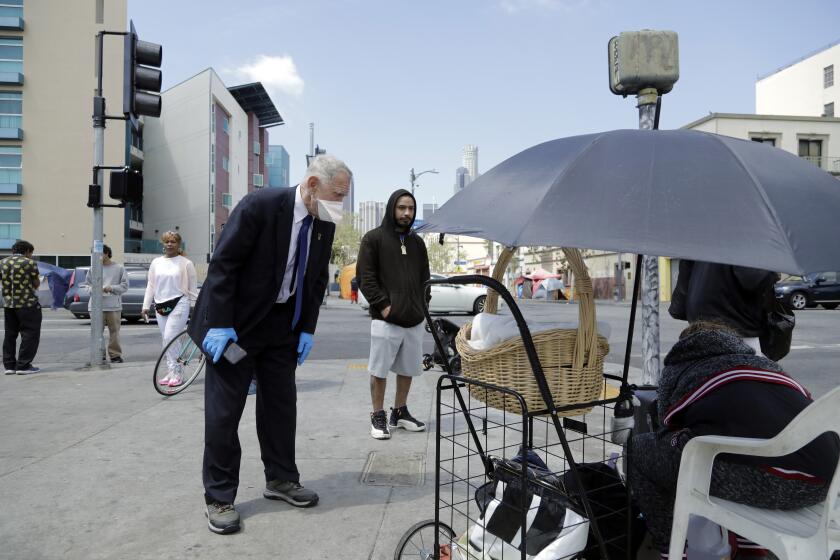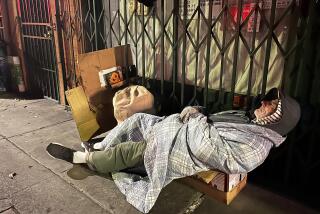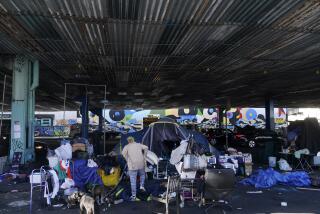Judge’s order drags Garcetti into center of legal battle over skid row
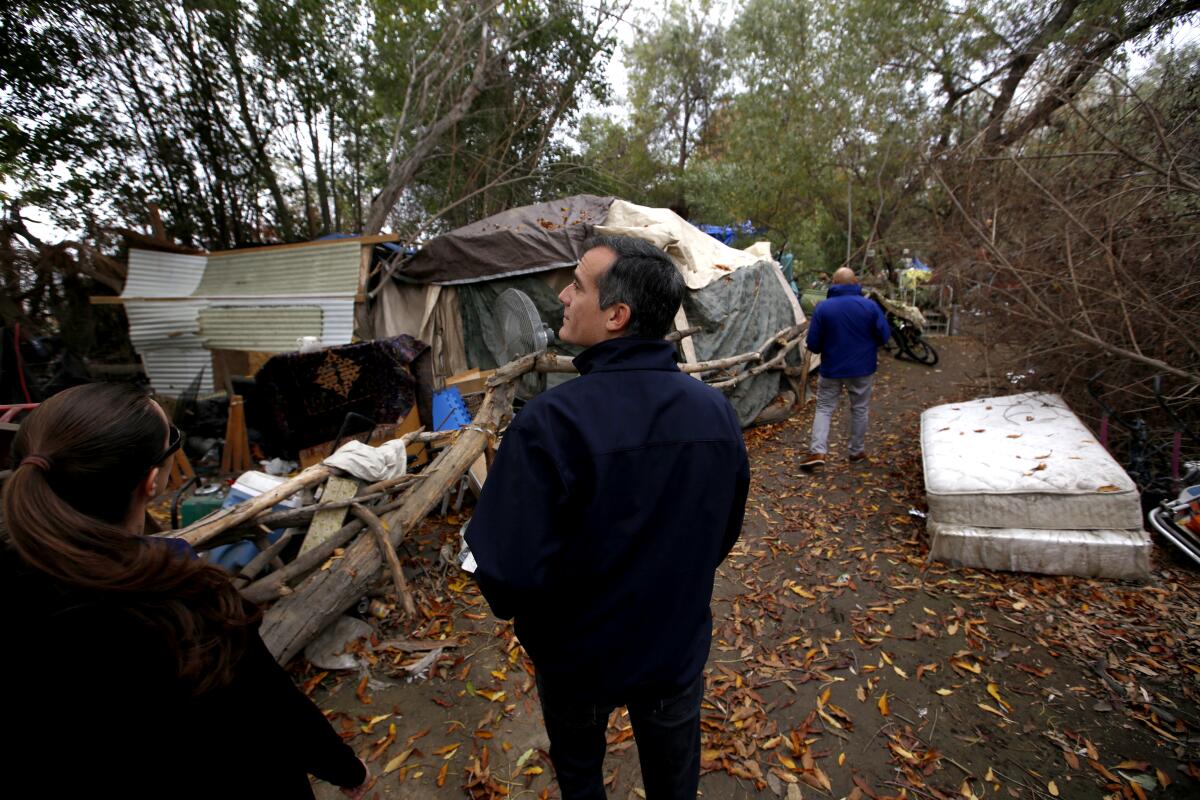
- Share via
It was supposed to be a banner week for Mayor Eric Garcetti.
On Monday, he gave his annual city address in which he predicted L.A. would roar back from the economic devastation of the pandemic.
The next morning, he unveiled his $11.2-billion spending plan for the city, committing $1 billion to homelessness in a “justice budget” that also promised to help address social inequity and racism.
But hours later, in a move that overshadowed those announcements, a federal judge issued a 110-page order that skewered Garcetti over the city’s homelessness response and required the city to house or shelter all of skid row’s homeless residents. The judge also ordered the city to put $1 billion into escrow for homelessness.
Judge David O. Carter’s order pulls Garcetti into a lawsuit that the mayor had largely avoided being enmeshed in until now.
A federal judge has ordered the city and county of Los Angeles to offer some form of shelter to skid row’s entire homeless population by October.
“Judge Carter has basically put this on Garcetti’s plate,” said Daniel Conway, policy advisor for the group suing the city and county.
The city attorney’s office handles litigation, and the City Council approves settlements against the city, which is why the council has taken an active role in the sprawling case. The mayor’s office has at points let other city officials lead in the case.
Before Tuesday, there had been some indications of the judge’s frustration with the mayor and other elected officials, but nothing that signaled the expansive criticism that Carter laid out in that day’s order.
Carter wrote that the “inaction of city and county officials” has left L.A.’s homeless residents living on sidewalks, parks and beaches, and that the city has fallen short of its goals to ease homelessness.
The judge’s order quoted speeches given by Garcetti over the years on homelessness in which the mayor repeatedly acknowledged the humanitarian crisis.
He also questioned why the mayor hasn’t declared an emergency declaration over the state of homelessness, a move Garcetti has repeatedly said doesn’t necessarily give him new powers.
The judge also criticized several projects launched under Garcetti that he said have not met their goals, including Project Roomkey, which places homeless people into hotels, and the city’s program to build homeless housing.
“Los Angeles has documented a long history of plans or budgets that have fallen short year after year, as the homelessness crisis worsens,” Carter wrote.
Garcetti declined to respond to Carter’s criticisms.
“If someone wants to personalize this, that’s my job,” Garcetti said, appearing Thursday in North Hollywood at a ribbon-cutting ceremony for the opening of a tiny-home village for homeless residents. “I get this [criticism] every single day.”
The mayor added that no one person is responsible for the homelessness crisis.
“I’m not in charge of the mental health care system,” Garcetti said. “I didn’t declare wars that brought people back with PTSD; I haven’t been putting people into prisons for years; I didn’t declare the drug war; I haven’t been in charge of the foster care system.”
Before last week, there had been little public friction between Garcetti and Carter, who is overseeing the lawsuit filed last year against the city and county of Los Angeles by the L.A. Alliance for Human Rights.
The group argues that the city and county have mismanaged the region’s homelessness crisis, wasted public money and violated the civil rights of those who live on the streets.
At 76, Judge David Carter knows he shouldn’t be on skid row exposing himself to the coronavirus. But he wants more for L.A.’s homeless people.
Carter is known to regularly email elected officials, including Garcetti, and has taken tours of homeless shelters and skid row with different Los Angeles City Council members.
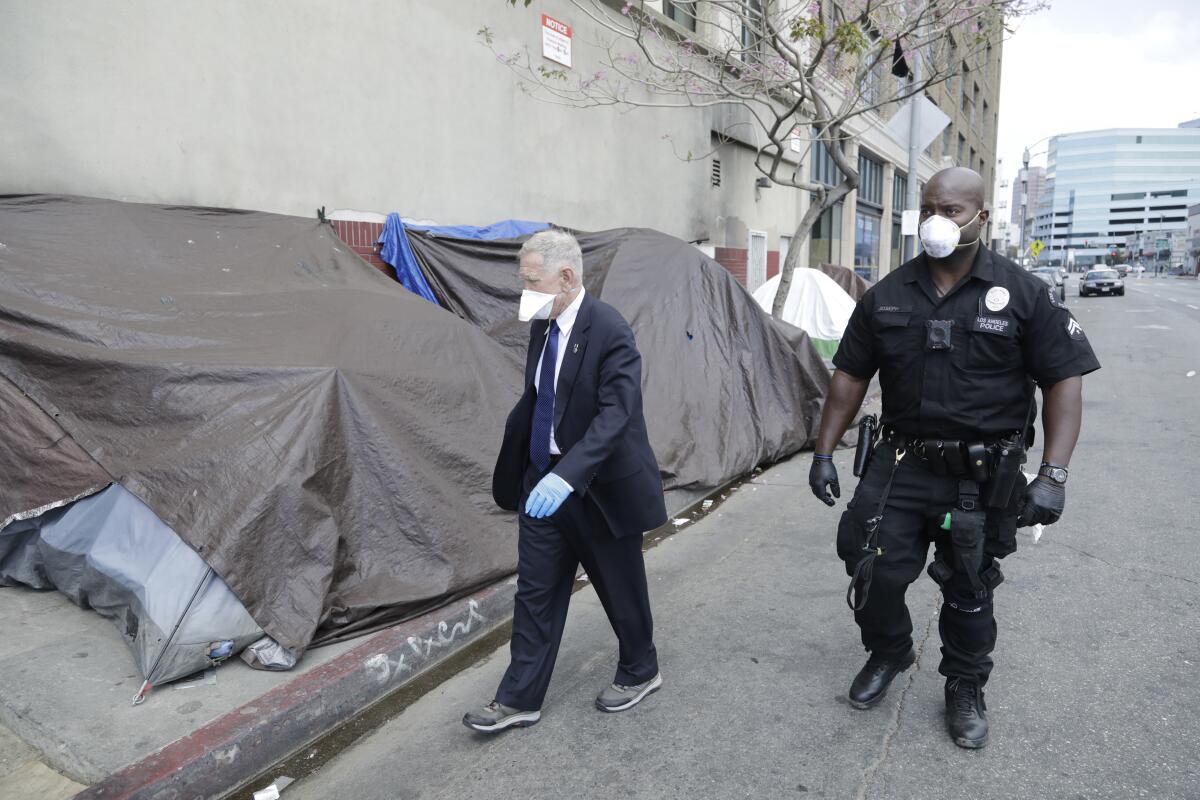
In his public statements, the mayor has been complimentary of Carter, who has a reputation for acting less like a judge than a politician and for unpredictable behavior.
At one of the first hearings in the case, Garcetti announced that he was at a meeting of the “Judge Carter Fan Club, Los Angeles chapter,” Los Angeles magazine reported.
And at a Feb. 3 media briefing, Garcetti told reporters he was proud of the progress the city has made. “I love Judge Carter,” Garcetti said. “I think he’s fond of me. I’ll let him say it. He’s said it many times.”
The mayor’s public tone and messaging about the case shifted dramatically last week.
At a media event after his budget release — an event where he was asked a number of questions about Carter’s order — the mayor suggested that the judge “stay out of our way.” He also said the legal order could threaten the city’s planned affordable housing projects.
For his part, Carter appeared to signal his impatience with the mayor at a public hearing in February where several city officials were summoned to speak to the judge.
Garcetti had publicly announced the night before that he wouldn’t be attending the hearing, but Carter repeatedly called his name at the meeting, bringing more attention to the mayor’s absence.
Rob Wilcox, spokesman for the city attorney’s office, declined to comment on the city’s notice of an appeal that was filed Friday. The county is also appealing.
Conway, advisor to the group that is suing, wants to see a Marshall Plan-like response to homelessness, referring to the U.S. aid program for rebuilding Western Europe after World War II.
He said the order opens the door for Garcetti to “do something that will be a model for the state and the country.”
Jessica Levinson, a professor at Loyola Law School, said she expects the city’s appeal will be partly a public relations tactic that lays out all the steps the city had already taken to address the crisis. At the same time, she expects the city to say that the judge overstepped his authority.
The order comes as Garcetti has a little over a year and a half left in office.
The mayor hasn’t publicly committed to serving out his entire second term — which is longer than normal because of a change in election dates — and there’s been speculation he could leave for another job before his term ends.
Now, he faces the prospect of a protracted court fight over the order in the coming months.
“I absolutely think it could drag out for a while,” Levinson said.
Times staff writers Benjamin Oreskes and Emily Alpert Reyes contributed to this report.
More to Read
Sign up for Essential California
The most important California stories and recommendations in your inbox every morning.
You may occasionally receive promotional content from the Los Angeles Times.

